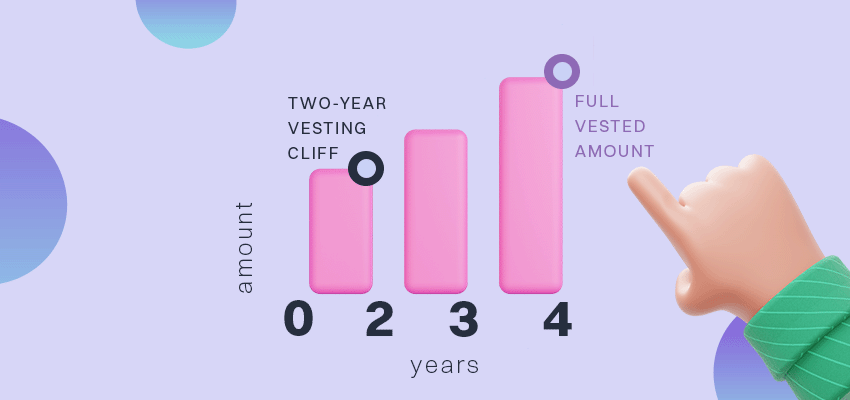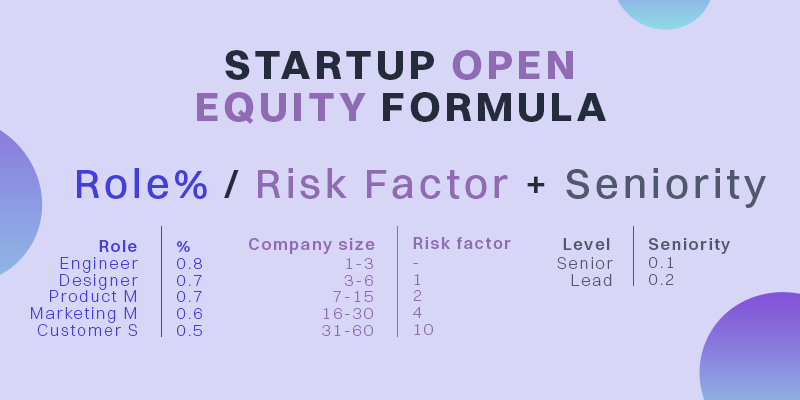Startup Employee Equity 101 – How to Give Equity to Your Team!
No pilot flies alone and every plane needs a crew. Likewise, every founder needs a team to take their idea off the ground. And yet, early-stage startups often do not have the budget to hire a dream team. This is why new companies often offer startup equity instead of salary to their first hires.
Close to 20% of the jobs ever posted at The Hub offer equity as a form of compensation.
Moreover, giving out startup equity also works as an incentive. Having equity, in short, means employees are directly invested in the company’s future. That may be why employees who own equity work on average 8 hours more per week than those that do not own equity.
Yet, giving out equity requires careful consideration. You need to figure out how much equity you want to give out of your company and when.
In this blog post, we’ll walk you through the different options available for giving out equity. And then, we’ll talk a little bit about the concept of vesting, so we can help you do the basic math on how much equity to give out.
Startup Equity Options: Stock Grants, Stock Options & Stock Warrants
There are three main startup equity options: stocks or shares, stock options and warrants. Each one of them has its benefits and disadvantages, depending on the country you are in. So before you make up your mind on an equity structure, please do consult with your lawyer. You should also consult with legal companies, many of them have free available consultations for startups.

1. Stock Grants
Let’s start from the real basics: One share/stock represents a slice of the company. Different stockholders own different amounts of stocks, representing their share of the company.
When we talk about stocks as a form of equity that´s given to employees, we often talk about a Stock Grant. A stock grant is simply the number of stocks an employer grants to the employee as a form of compensation.
Stock Grants are an especially good offering for a startup employee for three reasons: For one, early-stage startups often only share out a small number of stocks. Thus a single stockholder owns a larger share of the company. Secondly, as a stockholder, the employee will have formal rights over the company which increases commitment and motivation to make it successful.
And thirdly, the employee can receive the stocks immediately and at a market price. However, remember that for startups, there might be possible risks involved regarding liability. With Stock Grants, you are giving out a share of your company and also granting decision power to employees. Therefore, be sure to who do you want to grant that power in the team.
2. Stock Options
Stock options, as the name implies, are an option to buy or sell company shares at a discounted or stated fixed price. If you give your employee a Stock Option, you are giving them the promise of purchasing company stocks from you at a certain price. This price is normally better than one could ever find in the market. To give out equity in the form of stock options, you need to start with a stock option plan.
The plan specifies the price of the stocks or grant price, as well as the period during which the employees can exercise their options. The period is defined by a vesting date (more on this in the next chapter) and has an expiration date. An employee cannot exercise their options before the vesting date or after the expiration date.
The main benefit of Stock Options is that you are only giving out a possibility to purchase stocks – not the actual stocks. In addition, employees can only exercise their options in a given time frame, normally a few years after their employment. Therefore, stock options also serve as an incentive for the employee to truly commit to the startup for a set time frame.
3. Stock Warrants
Warrants are like stock options, with one major difference: With Stock Warrants you will give your employees the right to purchase stocks from your company. Whereas with Stock Options, you will give your employee the possibility to purchase stocks from you personally.
This may seem like a trivial difference and yet in practice, the difference is immense, especially to the finances of the company. The employee has to pay for the right to purchase the stocks issued through warrants. Hence, if you use Stock Warrants right you may not only build a committed team but capital for your startup.
What Is Vesting?

As mentioned among Stock Options and Warrants, a vesting date is the first date an employee can obtain their stocks. The vesting period refers to the time frame before an employee can fully exercise their Stock Options or Warrants. During the vesting period, the employee will receive a portion of the stocks every month or quarter (i.e. 1/16 or ¼), becoming fully vested after that date.
There is no “one-fits-all” when it comes to planning the vesting schedule for your startup. The typical vesting period seems to hit somewhere between 3 and 5 years. And, as a rule of thumb, most new employees are subjected to the so-called “cliff” period, when they will not receive any stocks. Typically, the “cliff” period in startups is the first year of employment. By following the “cliff” vesting schedule you can ensure that team you onboard is committed as the employees have a real incentive to stay for the first years of the journey. In addition, the longer the employee stays onboard, the more they can gain.
If you are currently planning your vesting schedule, you can continue reading more i.e. Georg Colindres’ post at startupPerColator on the common templates you can apply.
How Much Equity Should You Give Out?
Everybody in your team is equally important, right? Well, that might be true, but in many cases, you might want to prioritize the equity you’ll give away depending on the importance of the role for the company. Therefore, we created a clear formula you can use as inspired by Buffer’s public equity formula.

- Role: Decide which positions are important for your company and assign a percentage value from 0 to 1. Let’s say for example, in a software company, a Product Manager might be quite critical therefore you might assign this position a 0.7%.
- Risk factor: When you are one of the first three to start a startup, the risk of failure is high., or higher than if you joined in as the 60th member of a scale-up. The risk factor is the value that takes this difference into account. You can calculate risk factors based on the size of the company at any point in time by using multiples; 2 when you have 6 people, 3 when you have 15 people, and so on. In the previous case, if a new Product Manager joins the company when there are 22 employees total, his/her risk factor will be equal to 4.
- Seniority: Though we want to believe in flat hierarchies in the startup ecosystem, there still are differences in seniority level to take into account when it comes to contribution and added value to the company, so it would make sense to reflect that value on the retribution side. You can then add a value number to each seniority level; 0.1 for senior, 0.2 for Lead, 0.3 for director and so on. If our Product Manager is a “Senior Product Manager” you would add a 0.1 to his calculations.
Startup Equity 101? – Conclusion
We know that it is not easy to figure out how much or what form to give equity to your employees. There are several factors to consider regarding your equity planning: such as the employee vesting period, position and importance to your startup. To dive deeper into the world of equity, you can start with either this video from Y-combinator explaining your options or this amazing thread in Quora covering the FAQs answered by experienced founders.
And as for country-specific information, here are a few helpful links: